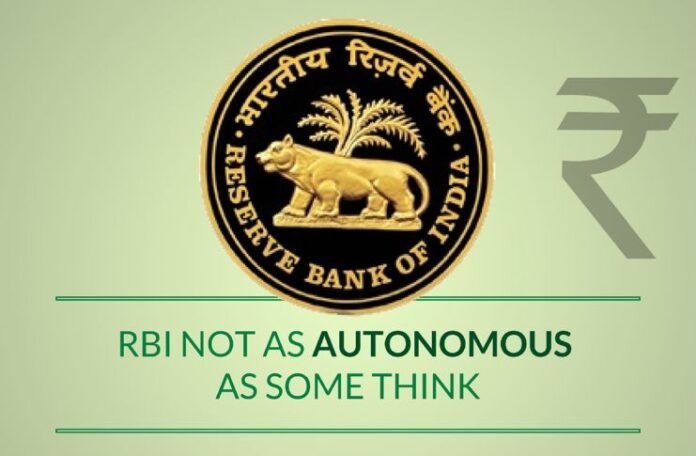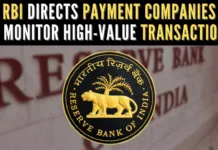
Y. V. Reddy, Governor of the Reserve Bank of India (RBI), who retired in September 2008 after a five-year term, uttered a classic oxymoron at an international conference that year. Responding to a question on the autonomy of the central bank of India, he said that his reply was “The Reserve Bank of India Governor is very independent. And, I took the permission of my Finance Minister to say this…”
The Governor caved in and has turned out to be an Under Secretary in the Ministry of Finance.
– Arun Shourie
This admission was a blow to the many in India who had believed that the RBI was “autonomous”. That this belief still prevails among the employees of the RBI itself was clear when their Union recently sent an open letter to the present Governor, Urjit Patel, pleading that he should not let the Central Government impinge on the RBI’s autonomy.
RBI employees can be excused for their ignorance. But what is one to say when a scholarly ex- BJP Union Minister is suffering from that affliction? On the Modi government’s advice to the RBI on demonetization being accepted by the incumbent RBI Governor, Arun Shourie is quoted as having said, “In its craven note (to the parliamentary panel), the RBI has slavishly reproduced some of the arguments trotted out by the government… The Governor caved in and has turned out to be an Under Secretary in the Ministry of Finance.” (George Mathew in The Indian Express, Mumbai Edition, January 15, 2016). Even allowing for the degree of Shourie’s frustration for being denied a place in the Union Cabinet, this outcry is very crude, if not uncivilized.
In any case, why should Shourie assume that Governor Patel was, in the first place, not in agreement with the demonetization idea of the Modi government? After all, Patel is a highly qualified and experienced economist in his own right — Bachelor’s in Economics from the London School of Economics, M. Phil. from Oxford University, doctorate in Economics from Yale University, worked at IMF India desk, a non-resident Senior Fellow at the Brookings Institution since 2009 and a close five-year association with RBI of which two were as an Advisor and three as a Deputy Governor.
Above all, the hailers of the RBI “autonomy” should remember Sections 8(1) and (4) of the Reserve Bank Act,1934 under which an RBI Governor is appointed by the Central Government who shall hold office for such term as the Central Government may fix. As ex-Governor Reddy said “The job of a peon or a clerk is more secure in the RBI than that of its Governor Everything depends on the trust the government reposes in him,” (the hindubusinessline story cited above).
All this is not to say that the RBI can act irresponsibly and yet let off scot-free by the people of India.
Here’s one more interesting facet of this RBI “autonomy”. In January 1978, when on the night of January 16, 1978, the Janata Party’s Government withdrew from circulation currency notes of denomination of Rs.1,000 and above, the Prime Minister was one who had for an era been a Congressman, chose the route of a Presidential Ordinance; it was done apparently without even consulting the then RBI Governor, the eminent I G Patel. But Patel kept silent – at least no evidence to the contrary has surfaced… And he, remember, was once the Director of the London School of Economics apart from having other qualifications and experience of an economist highly respected by international central bankers. Had I G Patel behaved “slavishly” by not resigning his job?
Then, there’s Section 7(1) of the RBI Act. It says “The Central Government may from time to time give such directions to the Bank as it may, after consultation with the Governor of the Bank, consider necessary in the public interest.” Clearly, the alleged “flip flops” of the RBI in the implementation of the 2016 demonetization may well be attributed to the Central doors.
Finally, there’s the axe that was felled on the RBI without even a whisper of protest — no economist, here or abroad, no past RBI Governor and no international central banker said a word. The RBI Act, 1934, was amended by the Finance Act, 2016, to provide for a statutory and institutionalised framework for a Monetary Policy Committee (MPC), for maintaining price stability, while keeping in mind the objective of growth. The MPC was to be entrusted with the task of fixing the benchmark policy rate (repo rate) required to contain inflation within the specified target level. Crucially, this new provision laid down that out of the six Members of MPC, three will be from the RBI and the other three will be appointed by the Central Government — with no clarity on a veto power, if any, of the RBI Governor. In exercise of those powers conferred by Section 45ZB of the RBI Act, 1934, the Central Government has accordingly constituted the stipulated MPC on 29th Sept 2016. Hence, instead of looking forward to the RBI Governor announcing the repo and other rates every two months in a Press conference, it will now be the MPC which will be the cynosure of all eyes. And remember, all this was done while the flamboyant, swashbuckling Raghuram Rajan was the RBI Governor! The crucial monetary policy function of the “autonomous” RBI was muffled, if not silently assassinated.
All this is not to say that the RBI can act irresponsibly and yet let off scot-free by the people of India. Sixteen years ago, in an official report, it acknowledged that “The RBI is not directly accountable to Parliament…” but “It is only in the case of issue specific, rather than general, inquiries that RBI officials are directly summoned by Parliamentary Committees, in contrast to the United States where Congressional testimony by the Federal Reserve is the practice.” (https://www.rbi.org.in/scripts/PublicationReportDetails.aspx?ID=184https://www.rbi.org.in/scripts/PublicationReportDetails.aspx?ID=184)
It is that rider which has now made three Parliamentary Committees summon the RBI Governor and his officials for an inquiry regarding their role in the November demonetization exercise. Two of them are headed by a Congress member, including the most important one called Public Accounts Committee (PAC). And, judged by some of the publicized questions asked by the latter, it seems the PAC Congressman is headed, not for an inquiry, but an “inquisition”. At least three of the publicized questions are vicious in content and intent. Here they are below:
-
“When was the notice sent to the RBI Board Members calling for an emergency meeting on November 8? Which of them attended this meeting? How long did the meeting last? And where are the minutes of this meeting?
-
“In the subsequent note sent to the Cabinet recommending demonetization, did the RBI explicitly mention that this decision would mean invalidating 86 per cent of the country’s currency and its attendant cost? How long did the RBI say it would take to remonetize?
-
“The RBI notification of November 8, 2016, under Section 3c (v) issued a restriction on withdrawal from a bank account over the counter to Rs.10,000 per day and Rs.20,000 per week. There was a similar limit of Rs.2,000 per day in an ATM. Under what law and powers of the RBI were these limitations imposed on the people to withdraw their own cash? What gave the powers to the RBI to ration currency notes in the country? If there are no laws that you can cite, why should you not be prosecuted and removed for abuse of power of office?”
Urjit Patel, the Governor, is scheduled to appear before the PAC on January 28 even as the other Parliamentary Committees are apparently awaiting their “kill.” The coming fortnight or so is therefore bound to be a litmus test for the RBI Governor. Will he survive or be guillotined…along with RBI’s “autonomy” image?
Note:
1. Text in Blue points to additional data on the topic.
2. The views expressed here are those of the author and do not necessarily represent or reflect the views of PGurus.
- To Editors’ Guild; May we also have our say… please? - July 17, 2019
- Farooq Sahab is either down with dementia or he is a congenital liar? - July 8, 2019
- Shah Bano, Muslims in gutter &Zakaria’s secularism - June 30, 2019










